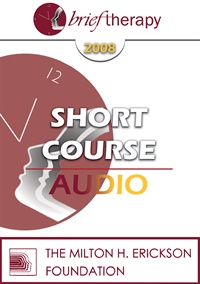
- Average Rating:
- Not yet rated
- Topic Areas:
- Short Courses | Utilization | Children and Adolescent Therapy | Seeding | Brief Therapy | Positive Psychology | Psychology
- Categories:
- Brief Therapy Conference | Brief Therapy Conference 2008
- Faculty:
- Peg LeBlanc, MA
- Duration:
- 1:27:10
- Format:
- Audio Only
- Original Program Date:
- Dec 11, 2008
- Short Description:
- The suggestibility of children provides an opportunity to build the strengths for lifelong mental resiliency. We will explore clinical practices based on research from brief strategic approaches, positive psychology, and the study of resiliency which suggest that long term mental health can be promoted through specific therapeutic approaches in treating children.
- Price:
- $15.00 - Base Price

- Average Rating:
- Not yet rated
- Topic Areas:
- Short Courses | Brief Therapy | Children and Adolescent Therapy | Anxiety | Ericksonian Hypnosis and Therapy Techniques
- Categories:
- Brief Therapy Conference | Brief Therapy Conference 2008
- Faculty:
- Lynn Lyons, LICSW
- Duration:
- 1:16:09
- Format:
- Audio Only
- Original Program Date:
- Dec 11, 2008
- Short Description:
- Excessive anxiety in childhood is a significant predictor of eventual comorbid depression and other conditions. This presentation will identify the cognitive processes and coping strategies that help create a cycle of anxiety, psychosocial isolation, and depression in anxious children and families. Attention will be given to the development of specific, empirically supported Ericksonian strategies which can help shift the anxious individual and family toward malleability, creativity and adaptability.
- Price:
- $15.00 - Base Price
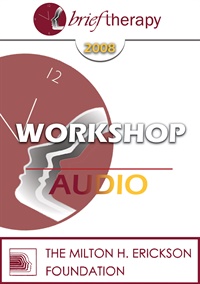
- Average Rating:
- Not yet rated
- Topic Areas:
- Workshops | Trauma | Brief Therapy | Children and Adolescent Therapy
- Categories:
- Brief Therapy Conference | Brief Therapy Conference 2008
- Faculty:
- Lenore Terr, MD
- Duration:
- 2:45:21
- Format:
- Audio Only
- Original Program Date:
- Dec 11, 2008
- Short Description:
- Whether brief or long-term, the treatment of childhood trauma should include an opportunity for the youngster to abreact (express strong emotion), correct (find individual, community or even fantasized solutions), and to discover contexts (perspectives and understandings of the events that occurred). Dr. Terr will thoroughly discuss and exemplify these three modes of treatment, selecting brief therapies as the clinical examples.
- Price:
- $15.00 - Base Price
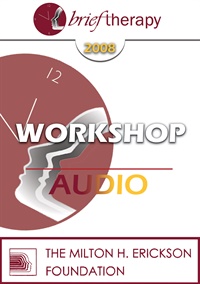
- Average Rating:
- Not yet rated
- Topic Areas:
- Workshops | Children and Adolescent Therapy | Brief Therapy | Meditation, Spirituality and Yoga | Mindfulness | Strengths-Based
- Categories:
- Brief Therapy Conference | Brief Therapy Conference 2008
- Faculty:
- Matthew Selekman, MSW
- Duration:
- 2:34:38
- Format:
- Audio Only
- Original Program Date:
- Dec 11, 2008
- Short Description:
- Adolescent self-harming behavior is on the rise and is one of the most challenging presenting problems school professionals, healthcare providers, and therapists will face in their clinical practice settings. In this "hands-on" practice-oriented workshop, participants will learn several distress management tools and strategies to strengthen the adolescent's self-soothing and coping capacities and family connection building rituals and therapeutic experiments to foster closer and stronger parent-adolescent relationships. Parent management skills for constructively responding to their adolescents' inevitable self-harming slips will be presented.
- Price:
- $15.00 - Base Price
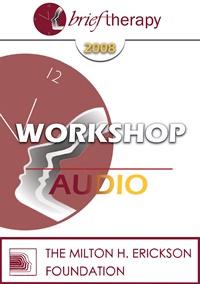
- Average Rating:
- Not yet rated
- Topic Areas:
- Workshops | Children and Adolescent Therapy | Family Therapy | Brief Therapy | Strengths-Based
- Categories:
- Brief Therapy Conference | Brief Therapy Conference 2008
- Faculty:
- Matthew Selekman, MSW
- Duration:
- 1:30:04
- Format:
- Audio Only
- Original Program Date:
- Dec 12, 2008
- Short Description:
- In this "hands-on" practice-oriented workshop, participants will learn effective engagement strategies with children, empirically-based parent management skills, and several family play and art therapy strategies that tap the inventiveness of the child and his/her family members to generate new ideas and co-construct solutions.
- Price:
- $15.00 - Base Price
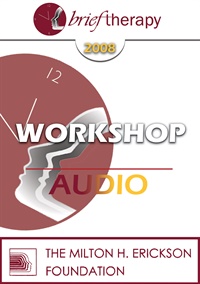
- Average Rating:
- Not yet rated
- Topic Areas:
- Workshops | Brief Therapy | Children and Adolescent Therapy | Divorce | Family Therapy
- Categories:
- Brief Therapy Conference | Brief Therapy Conference 2008
- Faculty:
- Florence Kaslow, PhD, ABPP
- Duration:
- 2:16:47
- Format:
- Audio Only
- Original Program Date:
- Dec 14, 2008
- Short Description:
- What are the differential impacts of divorce on children? This workshop will consider the thoughts, feelings, behavior, issues, concerns and needs of children in different age groups, from birth to 50 years, within the framework of the stages of the divorce process and for years afterwards. Lecture, discussion, clinical examples and role plays will be interspersed as efficacious interventions are considered.
- Price:
- $15.00 - Base Price

- Average Rating:
- Not yet rated
- Topic Areas:
- Workshops | Children and Adolescent Therapy | Trauma | Brief Therapy
- Categories:
- Brief Therapy Conference | Brief Therapy Conference 2008
- Faculty:
- Peter Levine, PhD
- Duration:
- 1:43:27
- Format:
- Audio Only
- Original Program Date:
- Dec 14, 2008
- Short Description:
- This workshop will explore trauma along a child's developmental continuum. We will investigate how the effects of trauma can result not only from catastrophic events, but from commonplace events. At the core of this understanding is the unique way that trauma is imprinted on the body, brain and spirit. This workshop will demonstrate how trauma can be both prevented and resolved through play, art and sensory-motor activities. Participants will learn through combination of lectures, videos, case presentations and experiential activities.
- Price:
- $15.00 - Base Price
Tags: Brief Therapy Children Trauma
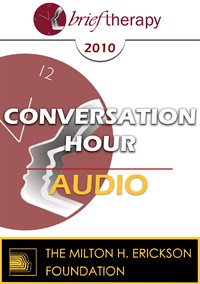
- Average Rating:
- Not yet rated
- Topic Areas:
- Children and Adolescent Therapy | Conversation Hours | Brief Therapy
- Categories:
- Brief Therapy Conference | Brief Therapy Conference 2010
- Faculty:
- Lynn Lyons, LICSW
- Duration:
- 1:03:35
- Format:
- Audio Only
- Original Program Date:
- Dec 11, 2010
- Short Description:
- BT10 Conversation Hour 02 - Brief Therapy with Children - Lynn Lyons, MSW Brief Therapy with Children with Lynn Lyons
- Price:
- $15.00 - Base Price
Tags: Children Adolescents Brief Therapy
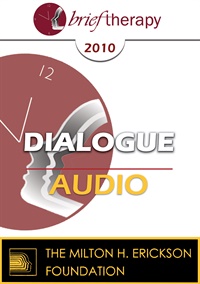
- Average Rating:
- Not yet rated
- Topic Areas:
- Anxiety | Dialogues | Children and Adolescent Therapy | Brief Therapy
- Categories:
- Brief Therapy Conference | Brief Therapy Conference 2010
- Faculty:
- Lynn Lyons, LICSW | Reid Wilson, PhD
- Duration:
- 1:01:54
- Format:
- Audio Only
- Original Program Date:
- Dec 11, 2010
- Short Description:
- BT10 Dialogue 02 - Anxiety in Children and Adolescents - Lynn Lyons, MSW, Reid Wilson, PhD Anxiety in children and adolescents dialogue with Lynn Lyons and Reid Wilson.
- Price:
- $15.00 - Base Price
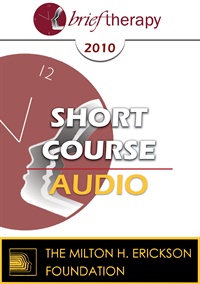
- Average Rating:
- Not yet rated
- Topic Areas:
- Children and Adolescent Therapy | Short Courses | Brief Therapy | Language of Hypnosis
- Categories:
- Brief Therapy Conference | Brief Therapy Conference 2010
- Faculty:
- Marilyn Wedge
- Duration:
- 1:05:37
- Format:
- Audio Only
- Original Program Date:
- Dec 09, 2010
- Short Description:
- The language a therapist uses to conceptualize and treat a problem determines whether or not that problem can be resolved effectively. Plato’s story of the cave, where the inhabitants see only shadows, is a useful metaphor for how the language of therapy can generate either confusion or clarity. The workshop will teach a method of effectively treating severe problems of children and adolescents, using an invariant opening question, strategic dialogue and metaphorical techniques.
- Price:
- $15.00 - Base Price
Please wait ...

